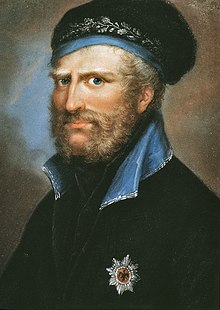Vienna Convention (1809)
The Vienna Convention was concluded on February 25, 1809 between Austria , represented by Archduke Karl of Austria and Wilhelm T. Freiherr von Steinmetzen on one side and Duke Friedrich Wilhelm von Braunschweig-Lüneburg-Oels on the other.
purpose
The purpose of the secret convention was the formation of a troop of 2,000 soldiers, each half consisting of infantry and hussars , who were to fight Napoléon Bonaparte's troops in Germany as part of the coalition wars under the leadership and at the expense of the Duke of Brunswick .
content
The convention comprised 18 articles, which among other things regulated the modalities of the listing as well as the borrowing to cover the accruing costs.
Article III prescribed the name of the unit:
- "This troop corps will be called the Ducal Braunschweigisches Korps ."
Article VII said:
- "As soon as this corps has been formed, the builder agrees to leave the assembly point at once with it and to begin his operations against the enemy in connection with the Austrian Corps d'Armée, which is at first, but then against Magdeburg , if possible , Cassel , Braunschweig or the Lower Elbe, to strengthen his corps as much as possible, but in general to work with all his might on the communications, magazines, artillery parks and supply transports of the enemy. "
Article X regulated that the new corps received weapons and equipment from Austrian arsenals .
consequences
After the troops had been set up on April 1, 1809 under the name "Herzoglich Braunschweigisches Korps" in the Bohemian town of Nachod , they first moved to Saxony under the leadership of the Duke and took part in various battles with Austrian units. After the defeat of the Austrian troops in the battle of Wagram and Znojmo , Friedrich Wilhelm broke the agreement with Austria.
He renamed his corps " Black Squad " and kept fighting with him via Halberstadt , which was captured on July 29th, and Braunschweig , in the immediate vicinity of which a battle took place on August 1st at Ölper , to Elsfleth and Brake , where he embarked with his troops for England to continue fighting against Napoleon in British service.
literature
- Gustav von Kortzfleisch : The Duke Friedrich Wilhelm of Braunschweig train through Northern Germany in 1809 . Mittler, Berlin 1894, (previously in: Militär-Wochenblatt supplement 9 and 10, 1894, ZDB -ID 207819-3 ).
- Ludwig Ferdinand Spehr : Friedrich Wilhelm, Duke of Braunschweig-Lüneburg-Oels . Meyer, Braunschweig 1861, ( Friedrich Wilhelm's Album 2).
Individual evidence
- ^ Ludwig Ferdinand Spehr: Friedrich Wilhelm, Duke of Braunschweig-Lüneburg-Oels . Braunschweig 1861, p. 1

